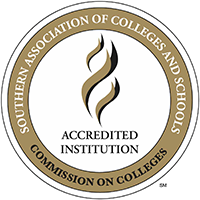Location
On Campus
Curriculum
120 credit hours
Program Length
as few as 36 months
Accreditation
Accredited by ABHE
Respond to Global Crises with a BS in Disaster Relief
The Bachelor of Science in Disaster Relief and Emergency Management program at Columbia International University will equip you with the knowledge and skills necessary to respond to global crises with Christian compassion, service and witness. Drawing on a foundation of Intercultural Studies, you will learn how to communicate effectively across cultures and understand different perspectives. From there, you will receive practical training in crisis response, team management and long-term relief and development.
You will learn how to respond quickly and efficiently to natural disasters and other emergencies, while also working to address the root causes of these crises. Our program will provide you with the opportunity to develop practical skills in project management, logistics and community development, all of which are essential for effective disaster relief and emergency management. As a student in this program, you will have the chance to work alongside experienced practitioners in the field, gaining hands-on experience that will prepare you for a career in disaster relief and emergency management. Whether you’re looking to make a difference in your local community or around the world, the Bachelor of Science in Disaster Relief and Emergency Management at CIU will provide you with the tools and knowledge you need to make a lasting impact.
Why Choose Columbia International University
A Bachelor of Science in Disaster Relief and Emergency Management at Columbia International University focuses on practical training that equips you to respond to disasters and crises with Christian compassion. Throughout the program, you will learn to pray with and offer basic trauma care to victims, helping to ease their suffering in the aftermath of a disaster. Our faculty members are trained experts with years of field experience in disaster relief and emergency management, providing you with valuable insights and real-world examples to guide your learning.
CIU’s program is also unique because of its emphasis on Intercultural Studies. By understanding cultures and communicating effectively cross-culturally, you will be better equipped to respond to disasters and crises in diverse communities around the world. You will learn how to manage teams and resources, as well as how to work on longer-term relief and development projects. With a focus on Christian compassion and service, our program will prepare you to make a difference in the lives of those affected by natural and manmade disasters.
Overall Benefits of the Degree
Natural and manmade disasters continue to impact people’s lives all around the world. There are countless opportunities and career paths available in disaster relief and emergency management. With a Bachelor of Science in Disaster Relief and Emergency Management from CIU, you will be well-equipped to work with a variety of organizations in this field. These may include:
- U.S. government agencies such as FEMA (Federal Emergency Management Agency) and Homeland Security. As a disaster relief and emergency management professional, you may work with these agencies to develop and implement emergency response plans, coordinate disaster relief efforts and provide critical assistance to affected communities.
- Faith-based humanitarian organizations that specialize in disaster relief and emergency management. These organizations may include well-known groups such as the Red Cross or Samaritan’s Purse, as well as smaller, faith-based groups that focus on providing aid and support to those affected by disasters.
- Mission organizations, churches and denominations committed to disaster relief and emergency management. As a disaster relief and emergency management professional, you may work with these groups to provide critical aid and support to affected communities around the world.
No matter which organization you choose to work with, a Bachelor of Science in Disaster Relief and Emergency Management from CIU will provide you with the knowledge, skills and hands-on training necessary to make a positive impact in the lives of those affected by disasters. From conducting risk assessments and developing emergency response plans to coordinating relief efforts and providing critical aid to victims, you will be prepared to respond to disasters with Christian compassion and a heart for service.
Featured Faculty

Edward L. Smither
Dean, School of Missions & Intercultural Ministry, Professor of Intercultural Studies and History of Global Christianity
What Will I Study?
In addition to the undergraduate core, here are degree specific-courses you can expect to take:
- ICS 3140 Cultural Anthropology
In this course, you will study cultural anthropology for the purpose of equipping followers of Christ to be competent interpreters of culture in 21st Century global contexts.
3.00 credit hours
- ICS 3300 Biblical Theology of Mission
You will engage in a comprehensive study of the biblical foundation for mission as it relates to the church's missionary obligation before God to the world in both word and deed. Special attention will be given to exposing you to important issues within evangelical missiology today.
3.00 credit hours
- ICS 4110 Intercultural Internship Preparations
This course is required of Intercultural Studies majors in the semester before the ICS 4930. You will prepare for your internship spiritually, mentally, and logistically. (Approval and registration are required in advance of the internship experience.)
0.00 credit hours
- ICS 4400 Practical Skill Development in Intercultural Studies
This course is designed to offer you ministry skills experience within the discipline, providing opportunity for you as an upperclass student to gain competency and confidence within related vocations. Experiential learning requirements are defined by your program and assessed by the program faculty. A minimum of 50 clock hours of direct experience is required for a unit of credit, and advisor approval is required. Repeatable.
3.00 credit hours
- ICS 4720 Contemporary Issues in Missions
This capstone course in the ICS undergraduate program draws upon visiting speakers on various subjects related to how to effectively live, work, and serve in multicultural settings.
3.00 credit hours
- ICS 4930 Intercultural Internship
This internship is required of Intercultural Studies majors, usually following the junior year (90 hours of course work). During this internship you will integrate guided study and field experience in cross-cultural ministry under an approved program and a CIU faculty mentor. (Approval and registration are required in advance of the internship experience.)
3.00 credit hours
- MSD 1210 Foundations for Calling and Work
In this course, you will explore the biblical and theological foundations for vocation with an eye toward your own future career interests. You will reflect on your chosen major and, as you begin that degree, make a plan toward your future career placement (3).
3.00 credit hours
- BUS 3800 International Business Practices
This course will explore the international dimensions of business, including globalization, developing and implementing strategies for international settings, cross-cultural human resource management, governmental relationships and laws, and unique ethical, cultural and legal considerations in international settings. You will learn practical skills necessary to conduct business internationally. International trade, antitrust, and the impact of economic free trade zones will also be studied. (3)
3.00 credit hours
- ENG 3810 Professional Writing
This course prepares students to write and produce the wide variety of workplace related documents typically required of writers by employers. Students will be challenged to develop a crisp and concise writing style through completion of short writing assignments, reports, and research projects. (3)
3.00 credit hours
- ICD 1100 Introduction to International Community Development
In this survey course, you will develop an understanding of key issues and dilemmas encountered in the international development field. Beginning with biblical and theological foundations and the history of community development, you will also explore concepts and theories of the development field. You will further study the role of non-profits, the most urgent development issues in the non-Western world, the current dilemmas for action, and the key actors and institutions who shape the development field (3).
3.00 credit hours
- ICS 3410 Business in the Mission of God
In this course, you will explore mission strategies using various business platforms for access into restricted or limited-access countries, focusing on such topics as "tent -making" strategies, professional service, corporate points of access, and ethics for the international entrepreneur.
3.00 credit hours
- ICD 3100 Introduction to Emergency and Disaster Management
In this course, you will focus on the history and origins of emergency management in the United States, which has influenced global practices. You will explore key disaster incidents, legislation and Presidential actions that impacted change within the emergency management profession. You will learn to identify emergency management issues and career opportunities in both the public and private sectors of emergency management (3).
3.00 credit hours
- ICD 3500 Social Issues in Emergency and Disaster Management
In this course, you will examine the loss and consequence issues that disasters create for a jurisdictions population including economic, psychological, emotional, and spiritual impacts. You will explore innovative and effective solutions for managing human conflict. You will focus on all stages of conflict resolution and transformation from interpersonal to international (3).
3.00 credit hours
- ICD 3410 Disaster Response Operations and Management
In this course, you will uncover the principles that promote effective disaster response operations and management. You will review the divergent approaches to disaster response operations (e.g., command and control vs. networking and problem solving). You will learn how to provide an effective response for the affected population and an overview of disaster response functions such as implementing the emergency operations plan, warning, evacuation, search and rescue, emergency medical care/mass casualties, mass fatalities, sheltering and mass care, donations management, damage assessment, the disaster declaration process, media relations/public information, individual and public assistance, and critical incident stress debriefing (3).
3.00 credit hours
- ICD 3420 Community Disaster Recovery
In this course, you will study a broad overview of both pre- and post-disaster recovery planning which enables communities, families, individuals, and, ultimately, a nation, to effectively and efficiently repair or reconstruct components of their community and regain stability in the wake of disasters. You will learn about the U.S. National Disaster Recovery Framework (NDRF), including its organizational structure, the Federal-local interface, the NDRF-specific assessment process, the six Recovery Support Functions (RSFs), and other related topics (3).
3.00 credit hours
- ICD 4112 Crisis Response and Trauma Care 3.00 credit hours
- ICD 4410 Building Disaster Resilient Communities
In this course, you will learn effective techniques to assist communities in building resilience to hazards. You will develop skills in formulating programs to strengthen resilience and assessing existing and emerging community conditions that contribute to vulnerability to hazards. You will learn to work with and effectively communicate with stakeholders and work as a member of a problem-solving team to lessen the future vulnerability of communities (3).
3.00 credit hours
Accreditation and Accolades


Career Path Opportunities
- Emergency Management Specialist or Director
- Disaster Response Coordinator
- Humanitarian Aid Worker
- Logistics Coordinator
- Community Outreach Coordinator
- Crisis Counselor
- Disaster Relief Consultant
- Non-profit Organization Manager
- Public Health Emergency Planner
- Environmental Health and Safety Specialist
Top FAQs
- What is the Bachelor of Science in Disaster Relief and Emergency Management?
-
The Bachelor of Science in Disaster Relief and Emergency Management at Columbia International University is a program that equips you with the knowledge and skills necessary to respond to natural disasters and crises while demonstrating Christian compassion, service and witness.
- What will I study in this program?
-
You will study a variety of topics related to disaster relief and emergency management, such as disaster response and recovery, crisis communication, team management, risk assessment and community development. Additionally, you will take courses in intercultural studies to help you understand different cultures and communicate effectively in cross-cultural contexts.
- What kind of career opportunities are available with this degree?
-
There are many career paths in disaster relief and emergency management, including working with U.S. government agencies such as FEMA and Homeland Security, faith-based humanitarian organizations and churches who are committed to disaster relief and emergency management.
- What kind of experience do the faculty members have?
-
Our faculty members are trained experts with many years of field experience in disaster relief and emergency management. They bring a wealth of knowledge and real-world experience to the classroom, helping to prepare you for a career in this field.
- What kind of practical training will I receive?
-
You will receive practical training in disaster response and recovery, crisis management and team management. Additionally, you will have opportunities to participate in internships and field experiences to gain hands-on experience in disaster relief and emergency management.
- How long does it take to complete the program?
-
The Bachelor of Science in Disaster Relief and Emergency Management is typically a four-year program. However, the length of the program can vary depending on factors such as course load and credit transfer.
- What kind of support will I receive as a student in this program?
-
As a student in this program, you will have access to a team of dedicated faculty and staff who are committed to helping you succeed in your academic pursuits and achieve your goals. Additionally, you will have access to resources such as career services, academic advising and student organizations.
- What kind of skills will I develop in this program?
-
You will develop a wide range of skills in this program, including critical thinking, problem-solving, communication, leadership and cultural sensitivity. These skills are highly valued by employers in a variety of industries.
- How will this degree benefit my career?
-
A Bachelor of Science in Disaster Relief and Emergency Management can benefit your career by providing you with a strong foundation of knowledge and skills in the field of disaster relief and emergency management. This can position you for success in a wide range of careers in this field, as well as other related fields such as public service and international development.
- Can I pursue further education after completing this degree?
-
Yes, many students who complete the Bachelor of Science in Disaster Relief and Emergency Management go on to pursue further education such as a master’s degree in emergency management, public administration, or international development. This can lead to more advanced career opportunities and higher earning potential.



